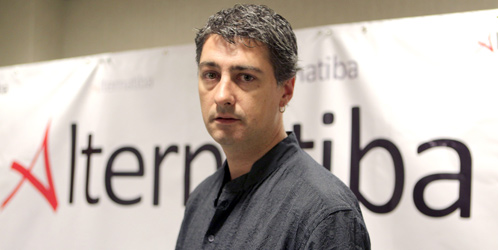No sign of peace or reconciliation in France-controlled Mali

French troops arrive in Mali.
Canada: New Democratic Party poised for power, but to what effect?

For more on the New Democratic Party, click HERE. For more on politics in Canada, click HERE.
By Richard Fidler
February 19, 2013 -- Life on the Left, posted at Links International Journal of Socialist Renewal with permission -- In the summer of 2012 I drafted an article on the New Democratic Party (NDP) for the purpose of introducing a discussion among some comrades seeking information about the party that now forms the official opposition in Canada’s House of Commons. While by no means a definitive study, the article draws on a number of books, academic papers and other documents addressed to the history and nature of Canadian social democracy, all of which are referenced or linked in the text. A French version of this article, addressed to a Québécois readership, is published in the current issue of the left journal Nouveaux Cahiers du Socialisme devoted to “La question canadienne”, a critical analysis of the “Harper revolution”.
Ten years since the biggest protests in history
February 22, 2013 – Green Left TV – The Green Left Report hosts a roundtable discussion and
Australia: Socialist Alliance perspectives for 2013

February 22, 2013 -- Links International Journal of Socialist Renewal -- The following document was adopted by the Australian Socialist Alliance at its 9th national conference, held January 18-20, 2013. It first appeared in Alliance Voices, the public discussion bulletin of the Socialist Alliance..
* * *
1. The international capitalist economic crisis is creating a wave of austerity across Europe and the advanced capitalist economies. Austerity measures, dictated by the international financial institutions (the IMF and World Bank) or carried out by governments on behalf of corporate interests, are driving millions into poverty, cutting welfare, slashing public spending on health and education, and slashing jobs and wages. So great is the crisis that millions of young people see no future in this inhuman system.
2. According to
reports, the World Bank's Food Price Index, which tracks the price of
internationally traded food commodities, was 6% higher in July 2012,
compared to the same time in 2011, and 1% over the previous peak of
February 2011.
'They will make splendid allies': The Communist Party of Australia and its attitude towards migrants

European migrants to Australia aboard the ship SS Dern
Day of the people: Gracchus Babeuf and the communist idea
Doug Enaa Greene delivered the above talk to the Revolutionary Students Union at the University of Utah on May 29, 2013.
France: New Anti-Capitalist Party congress wrestles with challenge of the Left Front

[Click HERE for more analysis and discussion of French politics.]
By Dick Nichols
February 15, 2013 – Links international Journal of Socialist Renewal -- The four years since the founding of France’s New Anti-Capitalist Party (NPA) have been a roller coaster rise and fall for the organisation, which was created in 2009 on the initiative of the Revolutionary Communist League (LCR), the former French section of the Trotskyist Fourth International.
The party’s rapid early growth seemed to confirm the premise on which it was founded — tens of thousands of France's workers and young people wanted to get active against capitalism’s crises and crimes, but were wary of existing left organisations and looking for a new sort of political home.
‘Toward the United Front’: Recovering revolutionary memory for 21st century socialism (+ video)
Part 1.
February 16, 2013 – Links International Journal of Socialist Renewal – On February 3, 120 socialists took part in a Toronto meeting to celebrate publication of Toward the United Front: Proceedings of the Fourth Congress of the Communist International, 1922, available in paperback from Haymarket Books. This 1300-page volume is the seventh book of documents on the world revolutionary movement in Lenin’s time edited by John Riddell. Riddell’s address to the Toronto meeting, below, explains the purpose of the book and the publishing project. The video of the event, filmed by Left Streamed, begins above and continues below. It was moderated by Abbie Bakan, with additional commentary by David McNally, Greg Albo, Suzanne Weiss and Paul Kellogg.
Basque Country: Movement for sovereignty and socialism on the rise

For more coverage of the Basque struggle, click HERE.


